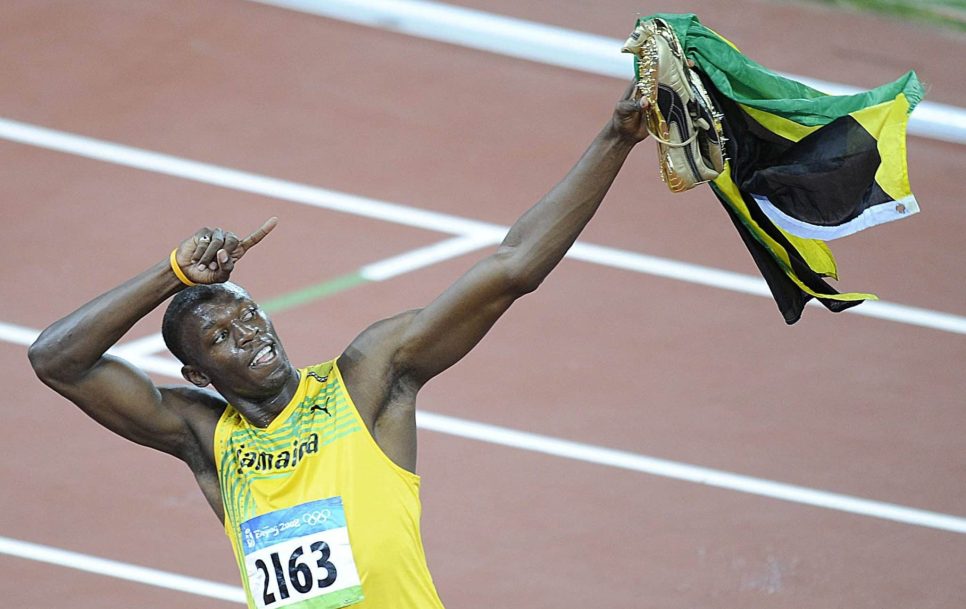Olympic icons: how Usain Bolt redefined speed
By the 2008 Beijing Olympics, it was clear that Usain Bolt was the fastest man on earth. Having broken the 100m world record on the last day of May, the Jamaican athlete left China a few months later with three gold medals and three world records.
Bolt first focused on the 100-meter sprint, where his significant competitors were fellow Jamaican Asafa Powell and reigning world champion Tyson Gay. It’s worth noting that Gay was struggling with a thigh injury before the Olympics.
Up until the Olympics, this trio had recorded the fastest times in the world. In May, Bolt ran a 9.72, snatching the world record from Powell, while Gay clocked a 9.68 with a stronger tailwind than allowed.
In Beijing, the American was eliminated in the semi-finals, Powell finished fifth in the final, and Bolt, the sole favorite who met expectations, set a new world record of 9.69 seconds. Despite his triumph, Bolt faced criticism from journalists and the president of the International Olympic Committee, Jacques Rogge, because he celebrated in the final meters after securing a significant lead in the first 70 meters. Critics believed that Bolt could have run a much faster time.
Science backed this opinion. Hans Eriksen from the University of Oslo and his colleagues analyzed Bolt’s run and found that if the Jamaican had not slowed down towards the end, he could have clocked between 9.51 and 9.59 seconds.
It’s also important to note that Bolt crossed the finish line first despite a poor start. Michael Frater, Richard Thompson, and Darvis Patton got off the line very well, and it took Bolt 30 meters to catch up with Thompson, who finished with a silver at 9.89 seconds.
From that point on, there was no doubt about the winner.
Bolt lost one gold and a record
Before 2008, Bolt was primarily known as a 200m runner, a distance closest to his heart. Thanks to his first gold, he had the chance to become the first athlete to win gold in both the 100m and 200m since Carl Lewis in the 1984 Los Angeles Games.
Michael Johnson, who held the world records for the 200m and 400m at the time, believed that Bolt would certainly win his second gold but would not threaten Johnson’s record.
However, Bolt, who practically walked at the end of his heats, set a new world record of 19.30 seconds in the final despite a headwind of 0.9 m/s. He became the first track and field athlete to break world records in sprint distances at a single Olympics.
There was no need for scientists to examine how fast Bolt could have run after the 200m final. The 195 cm tall sprinter pushed all the way and even leaned forward at the finish line to improve his time.
Three days later, Bolt completed a hat-trick with his three teammates by setting another world record of 37.1 seconds in the 4x100m relay. However, in January 2017, Nesta Carter’s positive doping retest stripped the quartet of both the gold and the record. The team also included Frater and Powell alongside Bolt.
Clean as a whistle
Three golds and three world records raised doping concerns again. The sprinting world had been hit hard in the years leading up to the Beijing Olympics, with Tim Montgomery and Justin Gatlin stripped of their 100m world records and Marion Jones returning three gold medals from the Sydney Olympics due to doping.
Bolt, his coach Glen Mills, and the Jamaican team doctor Herb Elliott repeatedly assured that the sprinting machine was clean. “We work hard, perform well, and know we are clean,” said Bolt, who also won three golds at the 2012 London Games and four years later in Rio de Janeiro.
While Beijing was Bolt’s first actual moment of stardom on the big stage, the peak of his career came a year later at the World Championships in Berlin, Germany. There, the Jamaican won three golds and set two world records that still stand: 9.58 seconds in the 100m and 19.19 seconds in the 200m.
In the relay, Bolt sprinted again with Powell and Frater, with Steve Mullings replacing Carter. They won gold but missed the world record by 0.21 seconds. Nevertheless, it was still an excellent time, setting a World Championship record and being the second-fastest time in history.
It’s somewhat regrettable that athletics fans never saw Bolt compete in other events. For instance, Mike Powell, who has held the long jump world record since 1991, believed that the sprinter could have been the first man to jump over nine meters.
Maybe, maybe not. What is clear is that Bolt is one of the greatest legends in sports, fulfilling his goal. “I want to be on the same level as Muhammad Ali and Pelé,” he said before the 2016 Olympic 100m final, describing how he wanted his legacy to be viewed.
It’s clear that Bolt’s 100m record will stand for a long time. Although times below 9.8 seconds have been recorded recently, the nine fastest times in history were achieved in 2012 or earlier.
Bolt’s 200m record might fall this summer at the Paris Olympics. American Noah Lyles clocked 19.31 two years ago and is determined to dethrone the Jamaican.







